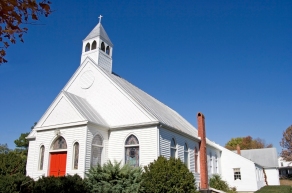
Last Fall, five faith communities from across the country embarked on their Pivot journey, an experience that now leaves them full of excitement, energy, and a sense of abundance for what’s ahead.
The Pivot program is a year-long, cohort-based online learning experience that allows smaller, under-resourced communities of faith to discern what God is calling them to be in their particular place and time while building relationships with other congregations from across the country. It also provides space for small church leaders to “pivot” their mindsets away from scarcity and failure, into identifying the key assets their congregation offers and the opportunities to engage and support their wider communities.
Continue reading...

A new energy is springing up in churches looking to inspire new gifts to endowment. We’ve recently talked to several churches who are making plans for an endowment campaign, whether to grow an existing endowment or start a new one. While there are several steps to success, in this blog post we’ll focus on one: engaging parishioners by telling the impact story of your church so far and linking that to a future vision.
Continue reading...

I believe God speaks to us in confluences. When people from diverse places and backgrounds come to similar conclusions on how a problem might be solved, I listen. When the burdens of a diversity of problems might be lightened by a single program or project, I pay attention to the possibilities.
Three years since COVID rocked our ecclesial equilibrium across the United States, a new confluence is emerging. Many cities and towns are experiencing an affordable housing crisis and a growing homeless population. A tiny homes movement is causing local governments to rework housing codes and permitting processes. At the same time, fewer people are involved in church, and fewer still are attending in person on Sunday mornings. Many parking lots that once were packed with cars now have easy access. Congregations are re-thinking mission in the community, considering anew how God might be calling them to share the resources they have, and realizing resources they had not considered before. Notably land.
Continue reading...

Monday Night Football doesn’t often trigger an agenda item for vestries. But the match-up on January 2 between the Cincinnati Bengals and the Buffalo Bills should. Most of you probably know the details by now: a few minutes into the much-anticipated game, Bills’ safety Damar Hamlin collapsed on the field, apparently suffering from a cardiac arrest. Although doctors are still determining what caused the often-fatal event, what is clear is that his life was saved by fast-acting medical personnel who delivered CPR and administered electric shocks from a defibrillator.
And here’s the agenda item for vestries across the church: schedule training for CPR AND buy a defibrillator. You may be thinking that this was a unique situation, and there’s no need to invest the money or time for such life-saving measures in the local congregation. You’re wrong.
Continue reading...

Gleaning: It’s not just for ancient Israelites anymore!
The ancient Levitical practice of leaving excess grain for those who are experiencing hunger has found a new manifestation in modern-day Memphis.
Church of the Holy Communion’s newest outreach ministry began with a phone call from a nearby synagogue. They had started collecting unsold food from local farmers’ markets and turning it into meals for hungry neighbors. But, they faced a challenge: Too much food!
Continue reading...

After five years of ordained ministry in parishes, and three teaching in a private school in New York City, I decided I would like to teach in one of the Episcopal seminaries. For that I would need a deeper academic background, so I pursued a Ph.D. in American Religious History at Harvard, specializing in 19th-century Episcopal history. I was especially interested in looking at the interaction of religion and culture. I was supported in this work for three years by a Fellows grant from the Episcopal Church Foundation. For my dissertation, I looked for the story of a church in an anomalous relationship to its diocese, thinking this would open a window into the religion and culture of the period. Soon I discovered St. Philip’s Church of New York City, the second Black Episcopal congregation in the country. St. Philip’s was listed in the annual diocesan journal for decades as “(colored - not in union with the diocese),” with occasional minor variations in wording. But no Episcopal parish can exist outside of the diocesan structure! My dissertation thus became the story of the 40-plus-year struggle of St. Philip’s to move from its founding in 1809, through the ordination of Peter Williams as the second Black priest in the denomination, to a regular worship life with the Book of Common Prayer and visitations by bishops, to only finally having its delegation admitted to the diocesan convention in 1853. It was a fascinating story with a great cast of characters, and after I spent a couple summers re-writing it into a more narrative form, it was published in 2005 by Columbia University Press as Faith in Their Own Color: Black Episcopalians in Antebellum New York City.
Continue reading...

Congregations within the Episcopal Church tend to be loners. We seldom interface with our neighboring Episcopal churches and are often detached from our diocese. While we celebrate similar milestones and struggle with the same challenges, it is rare for congregations to collaborate continuously for ministry.
In 2015, a collaborative ministry was formed within the Diocese of New Jersey to address the challenges and the unique needs of the ten historically Black congregations. The members of this ministry include clergy and lay leaders from these congregations and a Diocesan staff liaison. This ministry was named the Commission on Black Ministry (COBM).
Continue reading...

My wife and I had the pleasure of spending Holy Week and Easter in Abilene, Texas, where our son, David, is rector of Church of the Heavenly Rest. In addition to spending delightful time with our three granddaughters, we attended multiple church services with moving liturgy, inspiring preaching, great music, and lots of people. Everyone seemed so happy to be together and, after two years, have “normal” celebrations. Due to the ruling of a federal judge, the mask mandate was lifted on our flight back to New York – yet another indication of normalcy.
Based on anecdotal evidence, it seems as though Heavenly Rest was not unique and that most Episcopal parishes enjoyed robust holiday services which has generated some excitement, enthusiasm and even optimism. Was this just an Easter “flash in the pan” or an indication of new vitality? Might this mean that the pandemic slump in church attendance is finally behind us, and people will be coming back to church as before? Might we even be turning a corner when it comes to numerical decline?
Continue reading...

$10.4 billion annually. That’s what the so-called “self-help” industry is worth. By 2025, that number is expected to grow to $14 billion.
Search “what’s my purpose?” and about 6,860,000,000 results will be returned.
It’s a question I’ve long struggled with until this past year. Something came to me during one of my early morning walks with my dog, who is the best meditation partner one could hope for. My purpose, in fact our collective purpose as Christians, is the same: to expand the presence of God on earth by fully sharing the gifts which we’ve been given.
Continue reading...

Come Holy Spirit and kindle the fire that is in us.
Take our lips and speak through them.
Take our hearts and see through them.
Take our souls and set them on fire. Amen.
“Now the eleven disciples went to Galilee, to the mountain to which Jesus had directed them. When they saw him, they worshipped him; but some doubted.”
Not long after I was elected Bishop of Kansas, I was in a small coffee shop not far from Coffeyville, Kansas. There I sat, resplendent in my sincere suit, brand new purple shirt, and the shiny new pectoral cross generously given to me by my former parishioners at Saint Michael and All Angels, in Dallas, Texas. The cross, modest by Texas standards… was very likely the largest golden object in Southeastern Kansas at the time.
Continue reading...

Earlier this year, our Board of Directors adopted the “ECF Compass” – a rearticulation of our Purpose, Mission and Vision. This document also highlights who we are, what we do and how we do it. In addition to describing ourselves as Episcopal, Independent and Lay-led, we also state that ECF is inclusive, i.e, “we are anti-racist and committed to social justice, equity, diversity and inclusion.”
While the process does involve an important missional and strategic conversation, it is fairly easy for an organization to make bold statements about who it is or hopes to be. The challenge becomes whether these articulations are more aspirational than actual. When it comes to being Episcopal, Independent and Lay-led, ECF has a long track record of demonstrating and living out these core qualities of our identity. When it comes to being Inclusive, or more specifically Anti-Racist, we have a much longer way to go. Clearly, our commitment in this area is aspirational but, at the same time, very sincere..
Continue reading...

Change is inevitable; and, vestries are the key to the transformation. Governance for the sake of governance gives little attention to transformative leadership; but governance that focuses on missional ministry brings not just new structures but also new meaning. By leading such transformational change, the vestry creates the opportunity for the church to find not only vitality but growth. “The transformation of the church can be accomplished without losing what is precious to it, but it cannot avert change …the real work is to live into and through the dissonance that automatically comes with change, emerging with an even stronger faith.”
At our 2019 Diocesan Convention, citing Jesus in Luke 5, Bishop Gutiérrez urged us to ‘take our boats into deeper water to catch more fish’. Staying safely by the shore, maintaining the status quo, doing only what we knew how to do was not going to bring in the catch we were seeking. Instead he instructed us to “live fearlessly, and …continually reassess if our current structures are working. Let’s reassess and if they are slowing us down, if there are obstacles, if they keep us close to the shore, throw it overboard. Review what people are doing around the world and develop new structures that will help us to be innovative, agile, and keep going deep.” The charge of the transformative vestry is to go deeper into the un-chartered waters of ministry, following the missional template that Jesus gave us, only to discover a church we may not know but to which our faith will lead us.
Continue reading...

On January 15, 1941, at the Stalag VIII-A prisoner-of-war camp, in Görlitz, Germany, a crowd of prisoners and Nazi guards gathered in a freezing hall to listen to a performance.
The make-shift orchestra, made up of four prisoners performing the four instruments available at the camp – a worn-out cello, piano, clarinet, and violin – became one of the most famous compositions to come out of the war years.
At the outset of World War II, French composer Olivier Messiaen was drafted into the French army and assigned to a non-combatant role. Nevertheless, in May 1940, as France was succumbing to the Nazi invasion, he was captured at Verdun and taken to a war camp in a town near the border of Germany and Poland.
Continue reading...

Dear Friends,
While the COVID-19 lockdown over the past several weeks has been difficult for all of us, it has created incredible opportunities to connect with one another in new and innovative ways, even while physically apart. I have truly enjoyed my telephone and video conversations with many of you during which we have shared our struggles, fears and doubts as well as our hopes, dreams and yes, moments of joy. I cherish the many clients, colleagues and friends of ECF struggling to be faithful disciples during an unprecedented period of isolation and stress. This strange and difficult time is bringing out the very best in so many of us and it’s helpful to know that we are not alone.
We are also using this time to think, pray, discern and dig deep. We are trying to put aside those things that seem rather insignificant and rediscover values that lie at our very core – faith, family, friends and partners. Organizations like ECF are also engaged in this process, and we are reconnecting with our core values including partnership. I firmly believe that the only way the Church will move forward during and beyond this crisis is by identifying, developing and nurturing strategic, missional and transformational partnerships. I often say that partnerships are fun because they provide opportunities to meet and connect with other people who share our passion and commitment. But partnerships are also critical to our ability to survive, and even thrive, as the Episcopal Church. As we slowly emerge from this first phase of the pandemic and begin discerning what the Church and the world may look like, partnerships will provide us with the strength and courage to work together and carry us into a hopeful future.

Oliver J. Hart, bishop of the Episcopal Diocese of Pennsylvania from 1943 to 1963, confessed his struggles at one time with integrating churches in the Philadelphia area, telling The Philadelphia Bulletin: “It’s not just a question of Negro and white. It’s a problem of people moving from one place to another. If you could just put your churches on wheels, it would be much easier.” (Quoted in D. Contosta, This Far by Faith)
It’s a cute idea – churches on wheels. It’s also a compelling question. I wonder if we could at least find a way to put our buildings and received assets on foundations which are significantly easier to shift when, invariably, neighborhood demographics shift. One real asset of The Episcopal Church is our buildings. We have a lot of buildings – parish halls, rectories, other houses, chapels and churches. It may be that we have too many buildings, and too many aging, expensive buildings, at that, but we are quite rich in the asset-holding sector!
Continue reading...

The “we” I’m speaking of is all of us who make up The Episcopal Church, a church body split politically nearly the same way as all U.S. adults, and the healing I’m talking about is the healing of the division along political party lines.
I find it extraordinary that the denomination of more U.S. presidents than any other faith group, and indeed the place where the Trumps attend major holidays, still looks like the overall U.S. population in terms of political affiliation. The denomination of many early founders of our government, responsible for the good and the bad in our country’s early development, remains over-represented in Congress in terms of proportion of the elected body who are Episcopalian.
The Episcopal Church has an incredible opportunity to leverage our political composition, our level of education, our growing diversity, and our rich history to help our country heal the immense divide we are experiencing and reinvigorate compassionate, critical dialogue necessary for tackling the challenges facing our world.
Continue reading...

At a recent meeting, one of the assignments for our dinner conversation was to answer the question, “Name one thing that you cannot live without.” Given the occasion, many of the answers were frivolous and funny e.g. chocolate, hot water, the ocean etc. It is a question worth pondering seriously and also in turn asking in the context of our life as a congregation, “Name one thing that our congregation cannot live without.”
Personally, after we get past the life-saving items (food, water, shelter), the answers should reflect things that are truly important in our life: our family, friends, and yes, most importantly, our faith. Obviously, whatever we think we cannot live without is where we should spend our time and treasure. Experience shows that problems arise when these areas are not nurtured.
Continue reading...

The husband and wife were regular participants in the life of the congregation. They were in church most Sundays, in the thick of the chatter in the entrance hall and coffee hour. When the woman began the decline into dementia, her husband took care of her and they still came to church. “Don’t you look lovely today!” she would say. “It sure is a pretty morning!”. She was very cheery.
In time, the husband talked to the clergy about his increasing inability to keep her safe. And eventually, after one too many wanderings or stove incidents, he determined that the time had come to place her in a care facility that could meet her needs better than he could. He came to church the following Sunday without her. Everyone asked where she was, and he told them. People were shocked. “I had no idea!” was the universal response.

I serve a lovely church on top of a hill in a vacation community. The church is surrounded by lakes, and almost doubles its attendance in the summer. I serve as their part-time interim Rector. The church community has been declining; they have lost two thirds of their members in the last 10 years, and much of their energy has been spent caring for their aging buildings.
There are three buildings on the campus: the church building, the rectory and the parish hall. The church is beautiful. It was built in the 1840’s and is a typical New England white church with red doors, stained glass windows and a steep pitched roof. The church is beloved by the community and has been well cared for. The rectory has not been used as a rectory for decades; it is used mostly for office space and meetings, and is in very poor shape. The parish hall is almost as old as the church, is poorly designed and lacks function. The congregation has talked for years about renovating the parish hall, there are plans that date back to the 1960s, but nothing has been done. These three buildings consume most of their energy.
Continue reading...



















